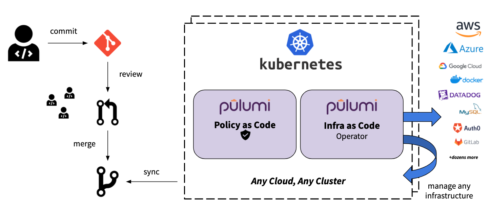
Infrastructure as Code platform Pulumi has announced new Kubernetes capabilities.
The new features include an in-cluster Kubernetes Operator, support for authoring Open Policy Agent (OPA)-based policies, a crd2pulumi tool for creating strongly-typed APIs for Kubernetes CRDs, and a tool for converting YAML manifests to Pulumi Python, TypeScript, Go, or .NET.
The new Kubernetes Operator provides a Kubernetes-native option for infrastructure delivery, the company explained. It also allows developers to specify what cloud infrastructure they want to deploy.
Support for OPA adds on to the company’s existing support for TypeScript and Python. According to Pulumi, OPA is an emerging standard for policies and is used across a variety of cloud native technologies. OPA can now be used to author policies that will run in Pulumi’s policy model.
The crd2pulum tool allows users to generate a strongly-typed API right from the CRD OpenAPI specification, as well as regenerate it if needed. According to Pulumi, the benefits of CRD are IDE tooling, strong typing, and the ease of creating new abstractions, and the benefits only multiply as infrastructure becomes more complex.
The company also added a new tool, kube2pulumi, that converts YAML manifests to Pulumi Python, TypeScript, Go, or .NET. “Kubernetes YAML offers a simple lowest-common-denominator approach for authoring configuration to apply to a Kubernetes cluster. But it is cumbersome to manage and difficult to scale as the complexity of the Kubernetes infrastructure and workloads increases,” Pulumi wrote in a post. According to Pulumi, languages like Python, TypeScript, Go, and .NET provide useful abstraction, strong typing and tooling, and testing.








